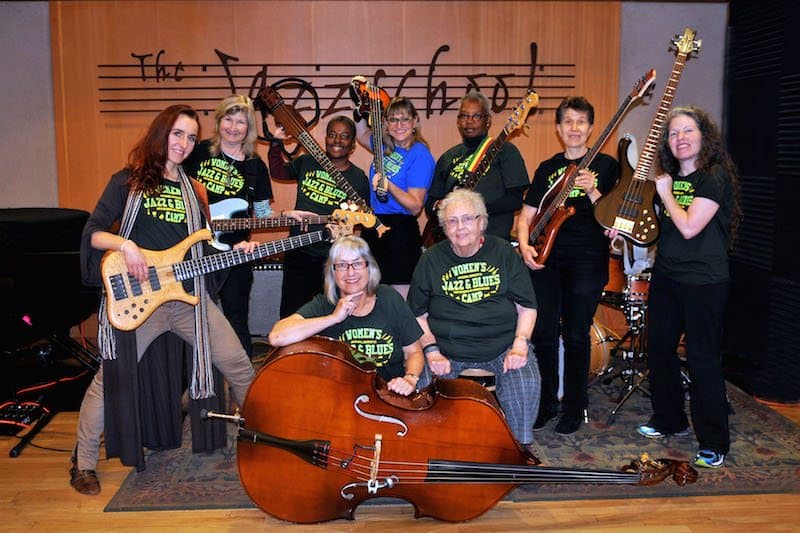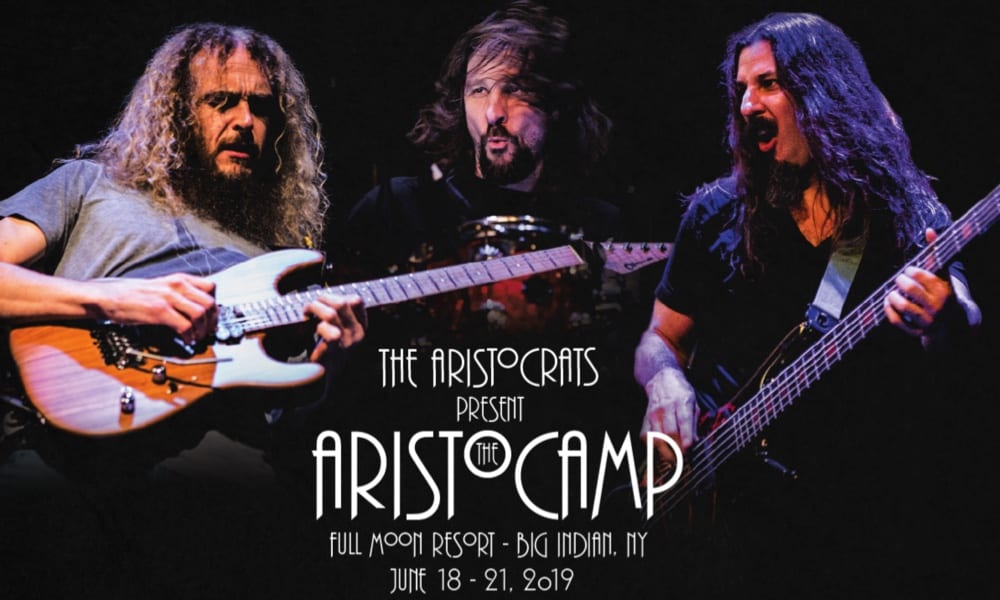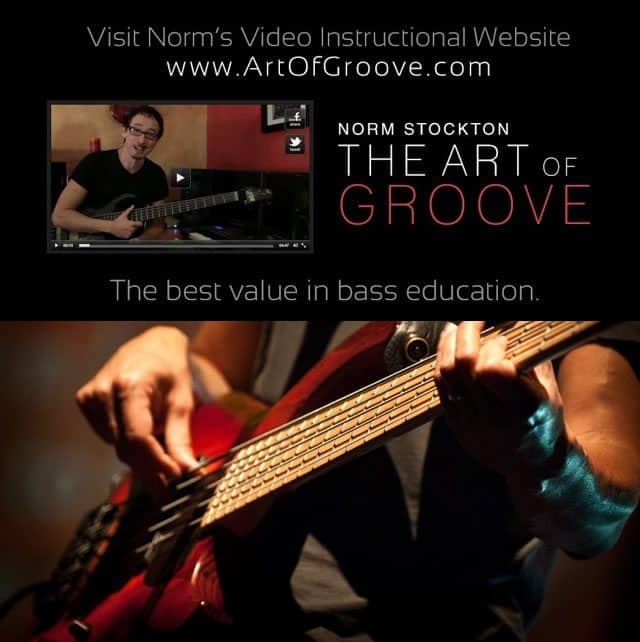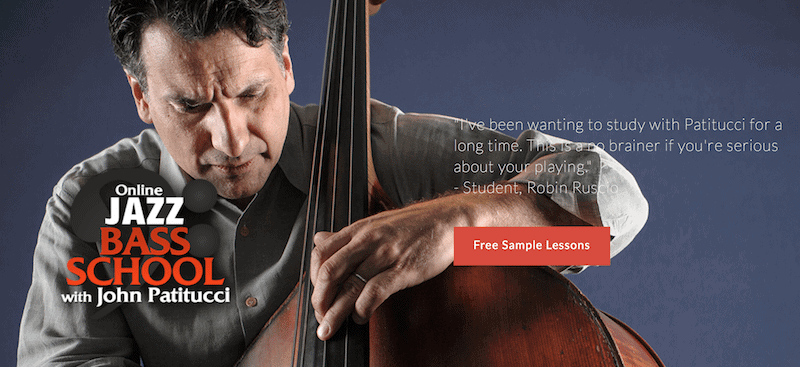Camps/Clinics
An All Female Jazz Camp – What gives? with Ariane C. Cap


2015 Women’s Jazz and Blues Camp | Ariane Cap, Christine Burrill, Liz Waiters, Leslie Betz, Mwamba Blakwomyn, Judy Graboyes, Liz Klute | sitting: Joan Lowden, Julie Lawyer | Photo credit: ©Jane Higgins Spotlight Photography
An All Female Jazz Camp – What gives?
It is 11.00AM on Monday, March 25th 2015, and the usual saxophone, trumpet and guitar cases are piled up in the hallways of Berkeley California’s Jazzschool. As on every Monday, you hear the muffled sounds of bands rehearsing, instructions shouted, occasional laughter. What is not business as usual, however, is that on this particular Monday the participants and instructors are all female. Were they all male with maybe an occasional female singer or pianist, it wouldn’t be worth extra mention. But for this week, The Jazzschool is exclusively dedicated to the underrepresented gender in Jazz. For five days, women instrumentalists and singers will hone their skills in ensembles and classes under the guidance of an all-female faculty. There will be a big concert at the end of camp.

2015 Women’s Jazz and Blues Camp | Faculty photo, left to right: first row: Ariane Cap, Jean Fineberg, Nancy Wenstrom-Catania | second row: Jennifer Jolly, Karla Gomez, Daria Johnson | third row: Maddy Duran, Janice Maxie-Reid, Ellen Seeling, Ellen Robinson, Marina Garza | Photo credit: ©Jane Higgins Spotlight Photography
Co-directors Jean Fineberg and Ellen Seeling have been running all-female camps at the Jazzschool since 2009. The first classes were directed at girls. But when the young players’ moms, aunts and grandmoms started saying “I wish there had been something like this when I was young.” Jean and Ellen said “why not now?” and held the first Women’s Jazz and Blues Camp in 2012. Both the Girls’ and Women’s Camps are now annual events, that have been growing from a strong 35 attendees right out of the starting gate to the maximum capacity the space can hold, which is 62.

Big Bottom Babes | 2015 Women’s Jazz and Blues Camp | Photo credit: ©Jane Higgins Spotlight Photography
The Big Bottom Babes” performing their Reggae – Swing Mash of Mr PC and It’s All About that Bass (Traynor/Davis). Featuring Leslie Betz, Liz Waiters, Liz Klute, Julie Lawyer on electric basses, Joan Lowden on upright and vocals, Jessica Gonzolez on drums. Ensemble leader: Ariane Cap | This performance was part of the Berkeley California’s Jazzschool event The Women’s Jazz and Blues Camp
Video participants: Leslie Betz, Liz Waiters, Liz Klute, Julie Lawyer, Joan Lowden, Jessica Gonzolez on drums. Ensemble leader: Ariane Cap | Video editor: Kim Starr-Reid
This begs the question: Why an event such as an all-female Jazz camp? A multi-instrumentalist and educator, Jean Fineberg, explains that a few years ago she and her partner, trumpeter and band leader Ellen Seeling, researched Jazz camps all across the country and realized that there were 90 percent boys in these camps with a faculty that was at 95 to 100% male. Surely, with this low percentage of female instructors and participants, it is not likely that women and girls would feel like they belonged. So, the idea to create a Jazz camp that was to exclusively cater to girls was born, and it would be taught by an all-female faculty.
The programs were an immediate success. It was palpable how comfortable the girls were among themselves, being with friends, supporting each other, having fun, making music. “One of the biggest challenges for young female musicians”, says Jean, “is that they are most often the only girl in the band. While the boys have friends, naturally get together and play or practice or bond otherwise, the girls are often excluded and drop out because of lack of peer support or role models.”

Bassist Julie Lawyer | 2015 Women’s Jazz and Blues Camp | Photo credit: ©Jane Higgins Spotlight Photography
Not only in the world of Jazz education are women and girls severely underrepresented, according to Jean, whose resume includes names such as David Bowie, Melba Liston and Chic. In the professional world she has often observed gender bias as well. For example, all other things being equal, usually the male player would get first chair in a big band. She also observes that male musicians tend to not want to send a female substitute at times, for fear of being perceived as weak. Bandleaders need to be educated, she explains, and suggests a remedy that has helped this problem in orchestras: mandatory blind auditions. Since the introduction of blind auditions in the classical world in 1975, the percentage of female instrumentalists has risen from 5 percent to more than 45%.
Women need to look at their own gender bias as well, says Jean. She recommends that female players seek out other women mentors and peers, but she warns them to avoid those who are not supportive of other women. Some, she says, want to be the only woman in the band. Others do not want to play with other female players for fear of appearing weak.
Her advice to aspiring female musicians is: “Brace yourself, because rejection is going to happen. Be strong emotionally, because you will often be the only female in the room. Associate with successful women who support you, and keep your eyes on the prize.”

2015 Women’s Jazz and Blues Camp | Photo credit: ©Jane Higgins Spotlight Photography
Back at the Jazzschool, the last period is underway and everyone is shuffling around chairs, sheet music and music stands. One ensemble sticks out for its unusual instrumentation – it is an ensemble of seven bass players and a drummer. The group explores non-traditional sounds and roles on the bass. On the agenda – a nod to a famous bass player – is the Coltrane standard Mr. PC in a reggae version, which will take a turn into double time swing, and, as a climax, will break into one of the participants, upright bassist Joan Lowden swinging her “boom boom” right next to her double bass singing a few chorusses of every bassist’s favorite: “It’s all about that bass” by Meghan Trainor (in the version of upright bassist Kate Davis of course).
If saxophonists, trumpet players, flutists and pianists are underrepresented in Jazz, rhythm section players such as guitarists, drummers and bass players can especially relate to the feeling of being the only woman in the band. The bass players range from beginners, to hobbyists to semi professionals, from young adults to seniors. Julie Lawyer, 75, who carries a tank of oxygen on her back right next to her bass gig bag, is attending for the third time in a row. Joan Lowden, a busy upright player and vocalist who started playing in her forties and who now manages and plays in several busy bands, says she much appreciates the all women environment and the small size of the camp: “I am usually the sole woman in my bands and when I go to jams (singers excepted). It is refreshing to play with women. We need a place to be supported and empowered with our peers. Many female players need a place to gain the confidence before they take their place in open (and more competitive) settings.”
Leslie Betz, who picked up the bass just a little over a year ago, agrees: “I loved the non-competitive and nurturing environment. No pressure other than the self inflicted!” (which, she adds, “is enough for us!”). Other than girl scouts, this was her first all female camp experience. Joan goes on: “I think that females tend to nurture others, which makes us good band leaders. We tend to think ‘ensemble’ more than ‘individual’. Also, many of the most ‘musical’ people I know are female.”
Judy Graboyes a percussionist and drummer, who picked up the bass two years ago, says: “Having been a drummer and Latin percussionist, I got a lot of skepticism from men. Often men would say ‘Let me feel your hands!’ to see how calloused they were. I guess ‘real’ drummers, in their eyes, have hard, calloused hands. I have also been in classes where men walked out because women were being taught Afro-Cuban rhythms that traditionally are not supposed to be played by women.” What retort does she have for critics who say all-female camps are excluding male campers? “I would say that male campers have thousands of camps to go to. They haven’t had the experience of being told that they can’t play certain instruments because they are only for boys. There is a very advanced high school big band that meets at the jazz school before my lesson. It is a huge group and there are no females in the entire room. I would show the critics a picture of that band. One picture is worth a thousand words.”

2015 Women’s Jazz and Blues Camp | Photo credit: ©Jane Higgins Spotlight Photography
Judy goes on to say: “I was in an all female band in the 1980s called the Blazing Redheads, and we won a NAIRD award, and people would say that we were a gimmick band. When we would go on tour in a van and a pick-up truck, and we would all pile out, people would stop and stare and ask us where we were going.”
“I recently went to a jam session with my bass, and although I was one of the first people to sign up, I wasn’t called up till it was almost over. I was the only female instrumentalist. People don’t understand that discrimination still exists against women and girls. When discrimination and inequality exists, there is a need for the targets of the discrimination to be able to gather on their own for support. As a white person, I would never tell an African American or Latino person that I feel excluded from their gatherings. They have every right to gather for support without white people there. That doesn’t mean that they hate white people. Similarly, women need separate space sometimes to support each other. It doesn’t mean that we hate men. The men who challenge that are the very reason that it is needed.”

2015 Women’s Jazz and Blues Camp | Photo credit: ©Jane Higgins Spotlight Photography
Bassist Liz Klute, who has a degree in music, joined the camp because she wanted to be in an ensemble with an excellent drummer. She says: “After having this experience I feel that every female musician should have this opportunity. I was taken seriously as a musician. It felt like everyday I was there to get some important work done. I had a vital role in every ensemble I played in and people were depending on me.” On the question of gender bias she offers: “Gender inequality in music is a serious issue that affects all of us, not just women. Women need the experience of being included and taken seriously to get past the tendency to hang back. Not that all women hang back, but it seems that in general they hang back more than men.” Remembering her experiences as a young aspiring musician, she realizes there were missed opportunities because she was a woman. “I wasn’t really aware of it at the time. I just thought that I wasn’t good enough. I hung around mostly male musicians in college, but I was never invited to a jam session, or asked to join a band. I dropped out and went back years later to have a similar experience studying classical guitar.”
As for these camps, they may just be addressing what’s needed, for young girls and never-too-old-to-learn women alike:
Christine Burrill, a busy LA filmmaker, has been playing the bass for two years and is very serious in her endeavor. Since she was looking for an opportunity to play with others in a band for the first time without feeling intimidated, the all female camp seemed like a great fit. She is glad she took the trip: “Other than my wedding this was the most fun experience of a decade!”
For information on the Jazz School’s events, please visit cjc.edu
Photos Courtesy of ©Jane Higgins Spotlight Photography
Visit Ariane Cap online at arisbassblog.com and arianecap.com

Photo, Tue Nam Ton TNT Photography
Camps/Clinics
The Aristocrats Announce Their Inaugural Music Camp ‘The Aristocamp’

The Aristocrats Announce Their Inaugural Music Camp ‘The Aristocamp’ And World Premiere Of New Material…
The rock-fusion instrumental trio The Aristocrats (comprising Guthrie Govan, Bryan Beller and Marco Minnemann) are pleased to announce The Aristocamp! A three-day music camp for guitarists, bassists, drummers and fans which will take place from June 18th to 21st 2019 in upstate New York. The Aristocamp will also feature the world premiere of new material currently being recorded by The Aristocrats.
This is the first music camp to be hosted by The Aristocrats and is guaranteed to be packed full of activities to educate, inspire and entertain.
Musicians and music fans of all ages, abilities and musical tastes are welcome at The Aristocamp. Attendees will be able to fully immerse themselves in the world of music, learning from the band, special guests and each other at a wide variety of workshops, jams, Q&As and instrument specific breakout sessions. There will also be opportunities to experience The Aristocrats on stage in an intimate setting, demonstrating their near-telepathic ability to improvise and have more fun than a fusion band has any right to have!
The event will be organized by Music Masters Camps, who are known for facilitating a highly interactive experience between artists and audience.
The camp will be held at Full Moon Resort, located a half hour west of Woodstock, NY. Full Moon Resort is a year-round mountain resort in the heart of the idyllic Catskill Forest Preserve. Superb dining, comfortable country inn accommodations, camping and commuter options are available.
The band are very excited to provide this unique experience, commenting:
“We’ve each been involved in music camps in the past and the highlight has always been interacting with the passionate musicians and music fans in attendance. Between us we have a lifetime of performing, touring and recording experience to pass on and this is the perfect environment to do that. Also, this time we’ll have the additional luxury of being able to zoom in on how we create our own music, and what happens when we interact as a band and play it live. We might even say it’s ok to break the rules now and then.”
The Aristocrats will be joined by some special guest musicians, to be announced soon.
Tickets are now available to purchase at www.aristocamp.com
Camps/Clinics
Free Online Bass Clinic

You love his BASS TIPS at BassBooks.com and his BASS LINES Column Here in Bass Musician, so now get in on a free online clinic!
Player, instructor, and BassBooks.com contributor Jaime David Vazquez is hosting a presentation about: “LEAD BASS” on Tuesday, October 30. Time will be 9:00 pm in Jaime’s native Puerto Rico; that’s 8:00 pm Eastern.
The clinic is free. Sign up via email at basseducinc@gmail.com.
Bass Edu
Norm Stockton’s Art of Groove Instructional Website {REVIEW}


Norm Stockton’s Art of Groove Instructional Website is chock full of 60 lessons for all bassists.
Wether you are an amateur, intermediate, or advanced player, there is something there for you on Norm’s Art of Groove Instructional Website. In addition to the 60 lessons available via subscription, there are also over 100 video’s available for either streaming or download. The streaming videos and downloads can be purchased without having a subscription. The streaming videos and downloads differ from the subscription just so you know that if you are a subscriber, the streaming and download section contains different lessons from the subscription portion.
Subscribing to the site gives you three different courses. Groove course level 1 covers all the fundamentals from getting you more familiar with the fingerboard, doing things such as scales, arpeggios, modes, developing the ear, and getting through a chart.
Groove course level 2 covers more on developing your ear, and delves right into creating grooves and even gives you the ability to be more creative with your own grooves.
Groove course level 3 explores a multitude of styles covering Funk, Country, Jazz, Latin, Reggae, R&B, and quite a few more. Level 3 also dives into combing and refining grooves.
Lessons are constructed using audio and video examples, pictures, and complete with notation and tab. Instructions are written out for each exercise, and as you progress, there are audio examples created with drum grooves for you to play along with, depending on the lesson you are currently working with.
Norm takes the grooves even further by giving examples of a note’s duration used with a groove and how it can change the feel of the groove, essentially making different statements with the same groove. I found this aspect of the Groove lessons very interesting. Not only does Norm cover the rhythmic aspect of a groove, the harmonic aspect is covered as well. He also explains the proper “tone” to use with a groove, for example, a Country groove is more of a warm round tone where a Reggae “tone” is warm, but also more staccato and muted.
The streaming video and download section of the website covers a lot with Rock bass, groove basics, the Grooving for Heaven complete DVD series, and real world insight. You can learn the bass parts that Norm used on his own releases as well as the bass parts from Lincoln Brewster.
Keep in mind that the subscription gives full streaming access to everything on the site, plus a 25% discount should the subscriber want to purchase a clip to download. It should be noted that some of the content is not available to purchase as a download even to subscribers, such as the LB song tutorials, 60-lesson groove course, etc. But most of the content can be purchased and downloaded and new content is always being added.
A subscription to Norm Stockton’s Art of Groove Instructional Website also gives you a 25% discount in his store. The store contains all of his CD’s, the Grooving for Heaven DVD series and transcriptions, Norm’s Worship Bass book, and some really cool t-shirts.
While a lot of sites just teach scales, modes, and technique, this site is completed by actually focusing on what every bassist needs to do, which is groove. Without the groove, there is no dancing or head-bopping and a band without bass is just, well, bass-less.
No matter what your level of proficiency, Norm has creative ideas that will expand what you already do and know, and for the subscription rate, it just cannot be beat!
Check out a free lesson from Art of Groove:
Visit online at artofgroove.com and normstockton.com
Bass Edu
John Patitucci Releases Electric Bass Lessons for Jazz Bass School

John Patitucci Releases Electric Bass Lessons for Jazz Bass School…
“For a long time I’ve been hearing from a lot of my students on my Jazz Bass School that they would like to see some electric bass curriculum. I’ve been thinking about it a long time, because I wanted to make sure I did it in a thoughtful way and not haphazardly. So I thought about it for a couple years, and I’m really excited with how it’s turned out. I think you guys are gonna have a lot of fun.” – John Patitucci
Three time Grammy Award winning bassist and instructor John Patitucci has added lessons for Electric Bass to his well established Online Jazz Bass School. Members will now have access to all lessons – including both acoustic and electric bass – each available for beginner, intermediate and advanced levels.
Over 100 new electric bass guitar lessons have been added, and as with the the existing bass lessons, John provides PDF transcriptions and all-star play-along MP3 downloads recorded by Jon Cowherd (piano), Brian Blade (drums) and Steve Cardenas (guitar). John’s approach focuses on foundational and technical skills but with a constant emphasis on musicality, sound and rhythm.
Newly added bass lessons cover the full range of experience levels – beginning with the names of the strings, basic sound production, arpeggios and chord voicing – carrying through all the way to walking over changes, using cell analysis, and advanced analysis (again with play-along tracks) covering styles such as Samba, Bossa Nova, and Baião, as well as Cha Cha Cha and Blues. The advanced analysis and play-alongs include a track taken directly from John’s latest solo album.
Also included are 24 bass etudes composed in all 12 major and minor keys, composed specifically for his students here at ArtistWorks. The etudes include downloadable backing tracks and charts. Some of the material references ear training and music theory lessons that John recorded for his acoustic bass lessons, all of which is accessible to members of his online school. The availability of the full acoustic bass curriculum provides a fantastic resource to the electric bass player, who is routinely challenged to provide an “acoustic sound” within the context of a jazz setting.
“The idea is to get the concepts and the language down of jazz. To listen and immerse yourself in this language – just like you learned your native tongue. You learned by hearing it from your folks; you learned from the immersion in it. You didn’t start off with grammar books. I want you to dive into the tunes – harmonically, the grooves that go along with the ideas – opening up your ears and being able to assimilate this language of jazz.” – John Patitucci
Visit online at artistworks.com
Camps/Clinics
The Collective School of Music Updates and Expands the Bass Collective


For people who might not know, The Bass Collective, accredited by The National Association of Schools of Music, was founded in the summer of 1996, and is a contemporary educational music institution for bass guitar. The Bass Collective offers a full range of private and group instruction on electric and acoustic bass for serious minded bassists. A sequence of courses covering every aspect of bass playing has been designed to meet the needs of the contemporary bassist.
The Bass Collective curriculum complements The Drummers Collective courses and stresses the all-important relationship between drums and bass in the most important contemporary music styles as well as reading, technique, performance, and a wealth of important topics that prepares all students for a career in music.
Just a couple of our notable Faculty members are:
Lincoln Goines
(Sonny Rollins, Gato Barbieri, Dave Grusin, Paquito D’Rivera, Michel Camilo, Eliane Elias, Michael Brecker, Bob Mintzer, Dave Samuels, Mike Stern, Wayne Krantz)
Irio O’Farrill
(Juan Carlos Formell, Bobby Sanabria and Ascención, Ray Mantilla, the Chico O’Farrill Afro-Cuban Jazz Big Band and the Dalton Gang, and many Broadway productions.)
Every semester, we have a minimum of 4 master classes with world class artists…. Past master class artists include Anthony Jackson, Victor Wooten, Chad Smith, Rocco Prestia, John Patitucci, and Billy Sheehan to name a few.
Programs of study range from part-time weekly, to bi-weekly lessons, to 2-year comprehensive full-time programs and can be arranged to suit individual schedule needs and financial circumstances. Our students come from all over the world and the typical age is between 18 and 35, but we have a program to suit anyone with a decent foundation.
We have 4 Full Time sessions per year that take place quarterly, and we have a wealth of short term programs as well as custom programs and offer a wide variety of performance classes focusing on everything from the basics of ensemble performance and interaction, to style specific classes, live recording, and public performances. In most settings students are playing with faculty and other professionals. Ensemble performance is at the heart of what we offer as a school.
Our programs offer daily assigned individual practice times as well as opportunities for additional practice time at off-peak hours. We offer very small classes, a world-class faculty, and a curriculum that is constantly improved upon to suit the ever-evolving world of music. It’s also an advantage to be located in the music capital of the world, New York City. And we currently offer interactive, one on one live lessons via apple iChat and are currently developing online course work which we hope to debut in early 2012. We also offer private lessons as well.
We regularly offer partial scholarships based on merit at the time of enrollment. Anyone interested can contact our Admissions Director John Castellano at johnc@thecollective.edu
For more information, visit online at thecollective.edu
For any further information, contact Anthony Citrinite anthonyc@thecollective.edu or call 212-741-0091



















